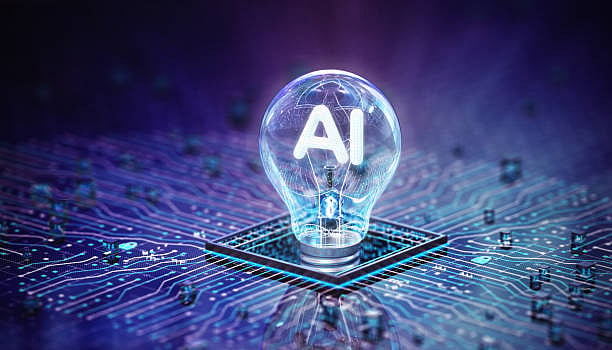
Image for representational purposes.
Credit: iStock Photo
Since Artificial Intelligence (AI) took the world by storm, there has been constant anxiety, doubts and discussion on whether human jobs will become redundant, and people who are comfortably going through their careers with their expertise and experience may suddenly find themselves jobless.
Each news about the capabilities of AI sets off panic, with more and more people fearing termination. The number of people enrolling in astronomically priced online AI courses in a bid to outdo AI has increased.
When there is a surplus of such graduates, the demand slows down and some of them find themselves directionless in their mid-career. One needs to be cautious. Some selected professionals who have the right skills and aptitude will make big money and will be successful; many others will have wasted valuable time chasing a mirage.
The irony is that the AI being new, we still do not have clarity on what aspects of it can be used where, and what needs to be learned by professionals from fields of technology, law, medicine, teaching, publishing, design, management, etc.
Hence, it is essential to understand which roles and functions are unlikely to be taken over by AI, at least in the foreseeable future. It is equally important to understand how AI can actually facilitate and enhance the efficiency of certain work roles, making humans more productive and successful.
Human roles
No software can replace human creativity for the simple reason that we have neuroplasticity, the ability to form new ideas and go into uncharted territories. Hence, “non-programmed decisions” which have no precedent will require human ingenuity, intuition and thinking outside the box. Humans will also continue to be needed for understanding cultural diversity and for dealing with conflicts and aggression.
Work profiles that will continue to require human effort include those that require physical dexterity, creativity, strategic planning, human interaction, performing arts, and music, among others. The output of AI is predictive, i.e. based on algorithms that have been fed in.
Another task that can be difficult for some AI models to take over is to relate to human emotions, understand or predict the behaviour of others (what we refer to as empathy), and convince customers or opponents based on their thinking and their needs.
Since Daniel Goleman introduced the concept of “Emotional Intelligence” in 1995, success in future has been predicted to depend 80% on emotional intelligence, and less than 20% on cognitive intelligence (IQ). The emergence of factors such as Data Science has further reinforced this. While unlimited data is available at the touch of a fingertip, behavioural scientists discuss how people become DRIP (Data Rich, Insight Poor). Similarly, Machine Learning, Internet of Things, and Robotics all rely on logical, analytical and sequential processing. To train an AI to process all these will take a lot of effort, something not all AI-making firms might want to invest in.
Since Generative AI creates new networks by learning patterns from existing data, there is a risk of disseminating false information, copyright infringement, and incorrect interpretation (“He became mad” in the US may mean he was angry, but in India it may mean insanity). The same applies to Predictive AI, whose role is to forecast and predict the future, but it is again based on existing data. Efforts are underway to incorporate quantum computing and brain-machine interfaces to enhance results, but it may take some time before they become reliable.
While cushy white-collar jobs may become rarer in some fields, there are also roles that AI cannot easily hit. Prominent ones include farmers, nurses and paramedical professionals, electricians, plumbers, carpenters, life skill trainers, musicians, creative designers, teachers, and craftsmen. Unlike in Western countries, such non-academic (blue-collar) jobs have not been in great demand, and they have not been earning much. But that is likely to change slowly but surely.
Up the ladder
Higher on the ladder are roles that are respectable but currently not much in demand: anthropologists, archaeologists and historians, researchers in both scientific and human behaviour realms, HR professionals, lawyers and judges, public speakers and actors, policemen, social workers and mental health workers, priests, and chefs.
Within the world of AI, Bill Gates suggests that people who develop AI systems and write code will continue to be in high demand, particularly those in areas such as debugging, refining, and advancing the development of AI. He has said that people in the fields of energy and biology will continue to be in demand worldwide.
Harish Iyer, a technologist with three decades of experience, notes that while AI is transforming many industries, certain professions remain resilient due to their reliance on human judgment, emotional intelligence, creativity, and ethical nuance.
He also discusses being aware of new developments that are coming in rapidly. For example, the emerging role of an AI ethicist. AI has many ethical issues that need to be addressed. This role basically monitors the outputs generated by AI models and suggests remedies. This role needs people from various domains based on where AI is being applied, not just computer science engineers.
Last words: You need not be an automobile engineer to drive a car, you need not be a hardware expert to use a computer, and you need not be an architect to live in a comfortable house. AI can make our jobs easier, provided we have the basic knowledge and understanding to use it wisely. Do not panic and rush to become an AI technologist if you do not have the aptitude; it is easier to pursue the career you like and are good at, and ask AI to make your tasks easier and faster.
(The author is an education and career counsellor)